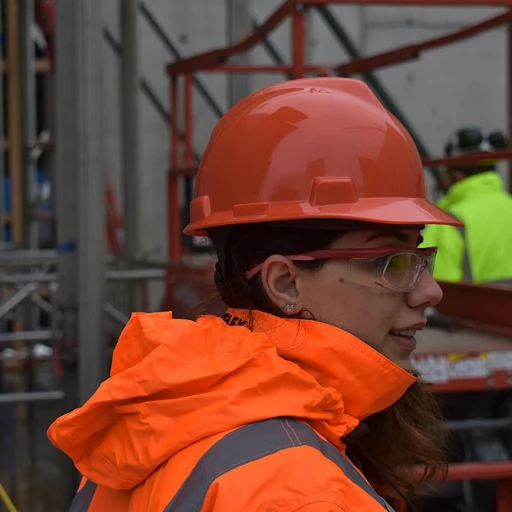
Understanding the Importance of Crane Certification
The Significance of Obtaining Crane Credentials
In the modern construction landscape, understanding the role of certification is vital, particularly when dealing with machinery as complex and powerful as cranes. By becoming an NCCCO certified crane operator, you elevate your professional standing and ensure that safety, precision, and efficiency are at the forefront of your career. Crane certification isn't just about a piece of paper; it's about demonstrating that you have mastered the necessary skills, both in theory and practice. Completing the NCCCO certification program involves rigorous training, both in the classroom and in hands-on environments, focusing on fundamentals including the operation of mobile cranes, articulating boom cranes, and telescopic boom cranes. There's a deep emphasis on safety within this certification process. Operators are trained to handle critical controls and address various challenges that come with crane operation. This helps mitigate risks and fosters a culture of safety that is paramount in a field where one minor miscalculation can have significant consequences. Moreover, the training includes understanding different crane mechanisms like fixed and swing cab, boosting your versatility on the field. You are prepared extensively for practical exams that test your real-world capacity to operate efficiently and safely. Another notable advantage of having a certification is the trust employers place in certified professionals. They know that an NCCCO certified operator has gone through comprehensive written and practical evaluations tailored to prepare professionals for the demanding nature of the job. As more construction roles necessitate a higher level of expertise, holding an NCCCO certification can open doors to diverse career paths. Certification not only sets you apart as a candidate but also as a trusted expert in crane operation. To truly master crane operation, consider following this certification with continuous education and upskilling. As with current educational trends, always remember to adapt and grow within your field, much like taking on advanced topics in other domains can enhance your knowledge further, such as through mastering AWS networking certification exam topics that can complement your technical skills.Steps to Achieve NCCCO Crane Certification
Embarking on the Path to Crane Success
Obtaining the NCCCO crane certification involves several key steps to ensure that you are well-prepared for both the theoretical and practical demands of the job. These steps not only equip you with the necessary knowledge and skills but also open up new avenues for personal and professional growth in the crane operation industry. First and foremost, enrolling in a reputable crane school is essential. These schools offer comprehensive crane training programs that are tailored to the type of crane you wish to operate, whether it be a mobile crane, articulating boom, or telescopic boom. A well-structured course will cover a mix of class and practical training, ensuring you gain a deep understanding of crane operation and safety measures. The training usually begins with theoretical lessons to prepare you for the written exam. This part of your crane training dives into crucial topics like crane safety, operational protocols, and proper maintenance techniques for both fixed cab and swing cab cranes. Passing the written exam is a prerequisite to progressing to the hands-on practical exams. Once you have a solid grasp of the theoretical components, the next step is to hone your practical skills with various types of boom cranes. During the practical exams, candidates demonstrate their proficiency in safely operating cranes under the supervision of certified instructors. This hands-on experience is vital, as it tests your ability to manage real-life situations that you will encounter as a crane operator. Achieving the NCCCO certification means you will be issued a certification card, a credential that enhances your credibility in the market and assures potential employers of your capabilities. With your certification card in hand, you will be well on your way to exploring numerous roles in crane operation. Moreover, it is also important to understand that acquiring competencies in areas like the rigger level is crucial, as these skills are an integral part of the certification process and career advancement. Remember that the journey does not end with obtaining a certification. Considerably, continuous learning and expanding your skills are critical to maintaining your edge in the ever-evolving field of crane operation. For more insights on initiating a learning mindset and embracing growth through further training, explore the [understanding fixed vs group mindset training] with certification.Skills Gained Through NCCCO Certification
Skills Acquired Through the NCCCO Certification Program
Embarking on the journey of obtaining your NCCCO Crane Certification is far more than just passing the exams. This comprehensive program equips aspiring crane operators with invaluable skills, deeply enhancing their professional capabilities. Whether you're aiming for operator certification in mobile cranes, fixed or swing cab, the NCCCO certification offers a plethora of skill enrichments.
Firstly, the training imbues candidates with an astute understanding of crane operation safety. This foundational knowledge is crucial, as operating heavy machinery like boom cranes or a mobile crane involves meticulous safety protocols to prevent accidents and ensure efficiency on site.
Additionally, the journey towards NCCCO certification encompasses both practical and written examinations. The practical exams test proficiency in operating different types of cranes, such as telescopic boom and articulating boom, ensuring a hands-on experience that translates directly to on-field competence. Crane operators are prepared to handle real-world scenarios, managing complex load moves under various conditions.
The written component, on the other hand, delves into theoretical aspects. It hones the operator's knowledge regarding equipment specifications, general maintenance practices, and operational regulations. The familiarity with these guidelines augments not only the operator's expertise but also their credibility in the field.
Moreover, specialized courses in the program, like rigging and signal person training, extend the skillset beyond mere crane operation, enhancing versatility. These skills fortify a crane operator's ability to manage and communicate effectively within a team, ensuring seamless coordination during crane operation projects.
In pursuit of these qualifications, aspiring operators often attend a crane school where a dedicated class schedule paves the way through in-depth training sessions and practice days to build expertise progressively. If you're exploring opportunities to upskill further, don't overlook the chance to broaden your horizons and explore relevant training avenues by finding language classes nearby, which facilitate better communication on sites with diverse teams.
Career Opportunities with NCCCO Certification
Expanding Your Horizons with NCCCO Crane Certification
Obtaining an NCCCO crane certification can significantly broaden your career horizon by enhancing your qualifications and opening doors to various opportunities in the construction and industrial sectors. As a trained and certified crane operator, you'll find that several paths become available, each of which can lead to rewarding experiences and career growth. One of the most immediate benefits of acquiring an NCCCO certification is the ability to operate a wide range of cranes, whether it's a mobile crane, boom crane, or articulating boom crane. This versatility is highly valued in the industry and can make you a more attractive candidate for potential employers. With specific certifications, such as those for telescopic boom cranes or fixed cab cranes, your credentials will help distinguish you as a skilled professional capable of handling the complexities of crane operation. Moreover, crane operators with NCCCO certification are often seen as leaders in the field, entrusted with greater responsibilities in crane operation and safety. Companies seeking to meet stringent safety standards value your ability to demonstrate competence in both written and practical exams. The certification not only assures your technical proficiency but also your commitment to safety practices, which is critical in high-stakes environments. The certification also paves the way for occupational advancements beyond crane operation. With the foundation set by rigorous crane training, you may choose to delve into related certifications that further enhance your expertise, such as rigger levels or safety management roles. As you navigate this path, remember the importance of continuous learning and upskilling beyond initial certifications. The industry is ever-evolving, and staying updated with new technologies and methods will maintain your edge in the competitive job market. Whether through advanced courses or specialized programs, the journey doesn’t have to end with your initial certification card. Always look for opportunities to refine your skills and expand your knowledge—ensuring a career that isn’t just elevated but also sustainable.Challenges in the Certification Process
Overcoming Hurdles in the Certification Journey
Embarking on the path to obtaining your NCCCO crane certification can present a few challenges. These hurdles often stem from various aspects of the training and examination processes. Understanding these potential obstacles can help future crane operators better prepare and ultimately succeed in securing their certifications. The certification journey involves both practical and written exams, each designed to evaluate different skill sets. While the written exams assess your theoretical knowledge and understanding of safety protocols, the practical exams test your hands-on skills in crane operation, whether it's a mobile crane, fixed cab, swing cab, articulating boom, or telescopic boom crane. This dual assessment is thorough, ensuring that operators not only know the principles but can also apply them effectively in real-world conditions. Another common challenge relates to the training schedule itself. Most crane schools offer courses that span multiple days, during which students must absorb a considerable amount of technical information in a relatively short timeframe. Comprehensive classes on crane operations, including boom crane mechanics and safety standards, require dedicated focus and practice. Time management and consistent preparation become crucial elements for success. Many candidates find the transition from theoretical learning to practical application daunting. To navigate this transition, operators should take advantage of additional crane training and operator certification programs, which often provide extra hands-on practice. These classes facilitate a deeper understanding of crane operations and better preparation for those critical practical exams. Lastly, testing nerves can be an issue for some operators. The pressure of performing under observation, particularly with practical exams, can hinder performance. Here, practice is key. Repeated exposure to crane operation in a controlled training environment can boost confidence, ensuring that skills are second nature by the time certification exams are administered. While these challenges might seem daunting, they ultimately pave the way toward becoming a skilled, certified crane operator. Persistence, discipline, and consistent training are integral to overcoming these hurdles and gaining the NCCCO certification card.Continuous Learning and Upskilling Beyond Certification
Embrace Continuous Learning and Upskilling
Achieving your NCCCO crane certification is an incredible milestone, marking your dedication as a crane operator. However, the journey doesn't stop once you obtain your certification card. In the dynamic field of crane operation, there is always more to learn and upskill to keep pace with industry advancements.
As a licensed operator, ensuring that your skills remain relevant requires ongoing education and training. Continuous learning can take several forms, such as enrolling in advanced crane school classes or participating in new crane training programs.
Crane technology is continually evolving, introducing new types of equipment such as the latest mobile cranes, telescopic boom, and articulating boom cranes. Keeping updated with these advancements and understanding the latest safety protocols is essential.
Engaging in practical exams and written exams regularly can also be beneficial, testing your understanding of new regulations and operational skills beyond the NCCCO mobile and fixed cab certifications. Attending workshops or classes can prepare you to handle different swing cab and boom cranes, enhancing your expertise in diverse crane operations.
Furthermore, it's crucial to connect with industry peers and veterans for insights into crane operation advancements. Participating in forums or professional groups can be a great way to exchange knowledge and discuss industry best practices.
Remember, the objective of ongoing education in crane operation is to expand your abilities and validate your commitment to this vital profession. By investing in continuous learning, you ensure your skills are sharp and comprehensive, ready to tackle the challenges and opportunities that arise in the field of crane operations.













